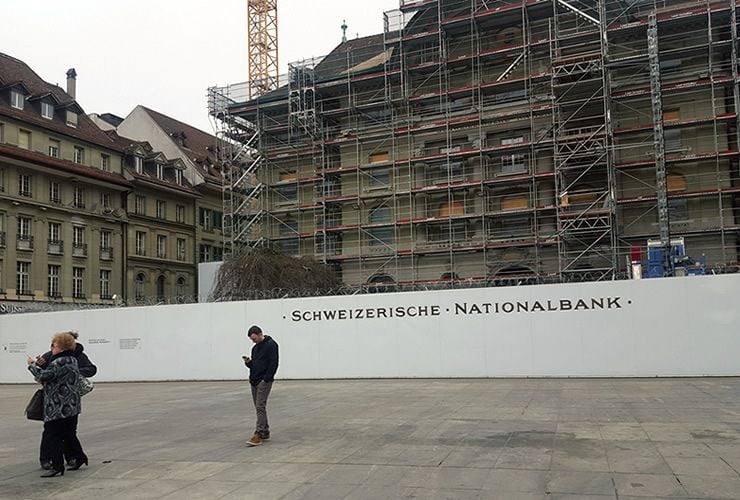Switzerland "Most at Risk of meeting US Treasury's Official Criteria of Currency Manipulation"

There are lots of reasons to buy Swiss: the five-letter prefix is a byword for caché, luxury, workmanship and class.
Then there is the allure of Swiss banking, the draw of low taxes to the wealthy, and the timeless, beckoning ski slopes and Alpine views to countless tourists.
It is no wonder then that the Swiss Franc does not lack for demand and is therefore one of the world's most expensive.
And of course, the CHF is an ultimate safe-haven thanks to the country's political and legal stability. So when investors grow nervous they often tend to buy Francs.
This has prompted the Swiss National Bank (SNB) to involve itself in a battle to devalue its own currency and ensure the economy is not priced out of the international marketplace.
Statistics suggest the SNB spend the equivalent of 9% of the entire country’s GDP on trying to weaken their own currency (by selling Francs) every year, making them one of the most interventionist central banks in the world.
In 2016 there were two major interventions - one after the Brexit vote in June and another after the election of Donald Trump to President of the United States in November.
The problem is, actively devaluing a currency goes against the rules of fairplay in international trade as it can be considered as state support that disadvantages trading partners.
The matter has grown in prominence now that the US has a new President determined to tackle global currency manipulation in order to level the playing field for the US economy.
“The Trump administration has spoken out against alleged currency manipulation from China, Japan and Germany. Yet the country most at risk of meeting the Treasury's official criteria of currency manipulation is probably Switzerland,” says Deutsche Bank’s Robin Winkler in a recent note seen by Pound Sterling Live.
Winkler goes on to say that the increased risk of the US penalising Switzerland may act as an incentive to the SNB to stop market interventions, leading to a move higher in the Franc.
What is the Definition of A Market Manipulator?
A currency manipulator has to satisfy three criteria set out by the Obama administration to be considered a currency manipulator:
1. It must spend over 2% of its annual GDP on currency intervention. "Tick. Switzerland spends 9%," says Winkler.
2. It must have a current account surplus (which is like a broader measure of the trade balance) of 3%. "Tick, Switzerland beats that with 10%," notes Winkler.
3. It needs to run goods trade surplus of over 20bn with the US.
Switzerland is not quite there with 13bn, “but the surplus has been growing at such a fast clip that it looks set to exceed the threshold in 2018, especially if USD/CHF strengthened further,” says Winkler.
Despite not quite meeting all three criteria Switzerland is nevertheless one of the most at risk countries for attracting the attention of the US authorities.
“Germany, Korea and Japan run huge surpluses but do not technically cap their currencies, notwithstanding recent American rhetoric. Switzerland's closest peer is Taiwan, which meets the Treasury's intervention criterion and has a large current account surplus, but its bilateral surplus against the US has stagnated below the $20bn threshold,” says Winkler.
Were Switzerland labelled a currency manipulator that would only be the first step in quite a lengthy process towards taking action, however, Trump could short-circuit that process using executive powers, possibly even choosing Switzerland to set a “symbolic precedent.”
Assuming the US retaliated with a 20% tariff on Swiss imports; this would be a severe blow to Switzerland.
Trade with the US accounts for only a seventh of gross trade but the balance with the US is so acutely skewed in favour of Swiss exports to US that it, “generates almost half of its net surplus,” according to Wilkins.
The damage to trade would be equivalent to that inflicted by an 8% appreciation of the Franc, according to Winkler’s calculations.
It would be greater than that inflicted if the SNB stopped intervening and let the Swiss Franc free-float.
“It is hard to assess how much the franc would appreciate if the SNB discontinued its market interventions, but given the price action of January 2015, we believe the market would equilibrate just above parity in EUR/CHF, implying less than an 8% fall in the TWI,” commented Wilkins.
The impact on the Franc from the US tariff option would be offset by reduced US demand for the currency but the impact would be slow as, “In practice, currency adjustment to terms of trade is very sluggish,” says Wilkins.
Overall, Wilkins sees the SNB discontinuing its market interventions as the most likely choice.
“Hence, the SNB letting EUR/CHF fall toward parity to avoid frictions with the US may be the lesser evil for the Swiss export-oriented industry than incurring US retaliatory measures, and it could join the financial sector in demanding an exit from unconventional policy,” said the Deutsche analyst.
Wilkins recommends staying short EUR/CHF using options as a way of profiting from the likely withdrawal of SNB market operations.



